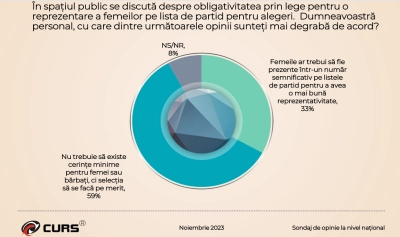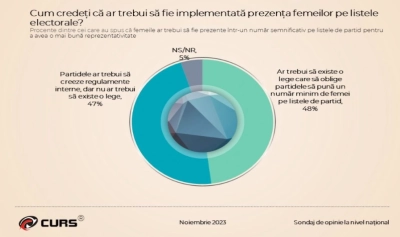A CURS survey reveals very interesting figures that could have a significant impact on how the electoral lists for the 2024 elections (European Parliament, local, and parliamentary) will be designed. Romanians want women on electoral lists, but based on merit! Among those who still prefer an imposed solution, only half support that this imposition should be done through legislation.
Regarding the public debate on imposing quotas for female candidates on party lists, 59% of respondents argue that there should be no minimum requirements for women or men, and selection should be based on merit. Meanwhile, 33% believe that, for greater representativeness, women should be present in a significant number on party lists.

In conclusion, the survey reveals that the electorate of all parties agrees that there should be no imposed minimum gender quotas, and candidate selection should be based on merit:
61% of the AUR electorate
59% of the USR electorate
54% of the PNL electorate
52% of the SOS Romania electorate (Diana Șoșoacă's Party)
59% of the PSD electorate
Urban voters are more categorical on this matter – 63%, compared to 52% in rural areas.
Looking at the distribution across historical regions, respondents disagree with imposing gender quotas for candidates, believing that candidates should be nominated based on merit:
Transylvania – 64%
Muntenia – 59%
Bucharest – 59%
Moldova – 50%
Analyzing the data by gender, age, education, occupation, and the sector in which they work, it's observed that, regardless of the segment, there are majorities of over 50% indicating merit as the sole criterion for candidate selection.
The most vehement are: Men in the 31-60 age group, with higher education, employed in the private sector.
The least vehement are: Women aged 18 to 30, with at most high school education, working in the public sector.
Opinions are divided among those who prefer an imposed solution: law or internal party regulations?

If we delve further to see who the 33% are that support the idea that women should be significantly present on party lists for better representativeness, we also observe the solutions supported by those interviewed:
48% believe that a law is needed to compel parties to nominate a minimum number of women on electoral lists (gender quotas),
47% are of the opinion that regulation by law would be excessive and that parties should be allowed to establish internal regulations to increase the number of women on electoral lists.
In terms of political preferences:
AUR: 47% support a law, 49% prefer internal party regulations
USR: 55% support a law, 45% prefer internal party regulations
PNL: 45% support a law, 55% prefer internal party regulations
SOS Romania: 42% support a law, 58% prefer internal party regulations
PSD: 51% support a law, 39% prefer internal party regulations
In terms of residential area:
Urban: 44% support a law, 51% prefer internal party regulations
Rural: 52% support a law, 42% prefer internal party regulations
By region:
Moldova: 49% support a law, 44% prefer internal party regulations
Muntenia: 61% support a law, 37% prefer internal party regulations
Transylvania: 47% support a law, 45% prefer internal party regulations
Bucharest: 48% support a law, 47% prefer internal party regulations
Responses are relatively balanced also regarding the distribution by gender, age, education, occupation, and the sector of activity:
The category that most strongly supports the need for a law to impose women on electoral lists is that of women aged 18 to 30, regardless of education and occupation but typically working in the public sector.
On the other hand, the category that most strongly argues against the need for a law is that of women/men aged 31-60 and above, typically with higher education, working in the private sector.
































Comentează